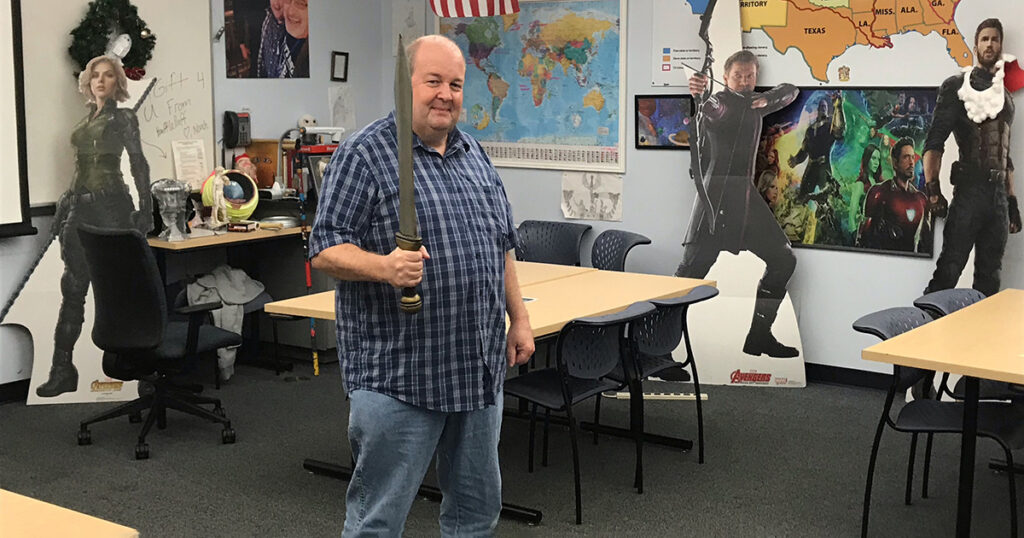For my first independent project as an intern at EFSC, I was sent to the Titusville Campus to conduct an interview with Instructor Luke Leonard. As soon as I laid eyes on the cardboard cutout of Luke Skywalker in his office, I knew I had come to the right place for a story.
The assignment was straightforward: Ask about his background, teaching philosophies, experiences in class, etc. What followed was an hour of discussing why Darth Vader is the greatest villain in history, as well as the reasons why “The Last Jedi” is a disappointment to the entire Star Wars franchise. I guess we talked about other stuff, too, but mostly about Star Wars. To be honest, it was refreshing to indulge in one of my nerdy passions again — one that I hadn’t thought much about since my 10-year-old self was still wielding a plastic lightsaber in the backyard. And after speaking with him, I immediately saw that Luke Leonard’s knowledge of the force is far superior to mine!
A Unique Approach To Education
In addition to his extensive understanding of pop culture, Luke Leonard takes a unique approach to education — one that landed him a position almost a decade ago teaching literature, history and humanities at EFSC. After earning degrees in literature and history from the University of Central Florida, Leonard went on to teach at UCF for many years, eventually bringing his expertise to EFSC in 2011. Now, the courses he teaches are a childhood dream — like the humanities course (HUM 2390) he taught during Summer Term 2019, which had a truly special curriculum topic (cue Darth Vader’s intro music): Supervillains.
Nerdvana in the Classroom
“I’ve been a nerd since I was born, and every time I teach these courses, it’s Nerdvana for me. I love teaching these classes,” said Leonard.
“If you had told me 20 years ago, ‘Hey, all these comics you’ve been reading your whole life? You’re going to teach classes on this,’ or ‘All these sci-fi stories you watch all the time? You’re going to instruct this,’ I would’ve called you nuts.”
Along with watching the world’s most famous supervillains on screen, students also read Joseph Campbell’s “The Hero with a Thousand Faces,” which is a book on the fundamentals of mythological heroism. It is said that George Lucas used this book as the basis for the entire Star Wars series.
Aside from supervillains, some of Leonard’s favorite topics he has taught at Eastern Florida include Harry Potter and J.R. Tolkien’s “The Lord of the Rings” trilogy, along with traditional American history and literature classes.
A Balanced and Unbiased Teaching Philosophy
Leonard is also very particular about what he shares in class. His teaching revolves around being unbiased, no matter the course content.
“I try so hard not to teach anything that I believe. I don’t get paid to teach my political, philosophical or religious views. Students come to learn a curriculum. If they ask me what I believe I always say, ‘I’m not going to tell you that. When you’re no longer a student, then I’ll tell you.’ I’ve had teachers who taught their biases and philosophies, and you had to give the answer they wanted. I hated that, and I refuse to do anything like that.”
Encouraging Independent Thought in Students
When it comes to his students’ essays, Leonard has more of a laissez-faire philosophy (and one I wish my former literature professors had also used).
“I give them prompts, but they can attack it anyway they want,” said Leonard.
“If they don’t like any of the prompts, they can write one up and send it to me. I might modify it a little bit, but then they can answer the prompt they created. The point is for them to think, not for them to dogmatically answer a question the way I want them to, and I get great answers as a result.”
The Importance of Humanities in Education
If watching Marvel or Star Wars movies in class isn’t enough to grab your interest, Leonard offers other convincing reasons why Special Topics in Humanities should always be part of a well-rounded college education.
“Taking a literature/humanities class lets you be introspective. It lets you learn things more than just dates, figures or formulas. It teaches you what’s important in life. Humanities teach us how to be the best versions of ourselves and help us learn what we really enjoy doing.
“When we do things that we enjoy, they speak to us in some way. Generally, our jobs don’t always do that. A job is something you do, not something you are. The things we enjoy are what engage us on a personal level, and they’re the things that, in some ways, have the most profound effects on us.”
How to Enroll in Luke Leonard’s Classes
Interested in taking a class with Luke Leonard? Use the EFSC Class Schedule Search to see what he’s teaching next!




